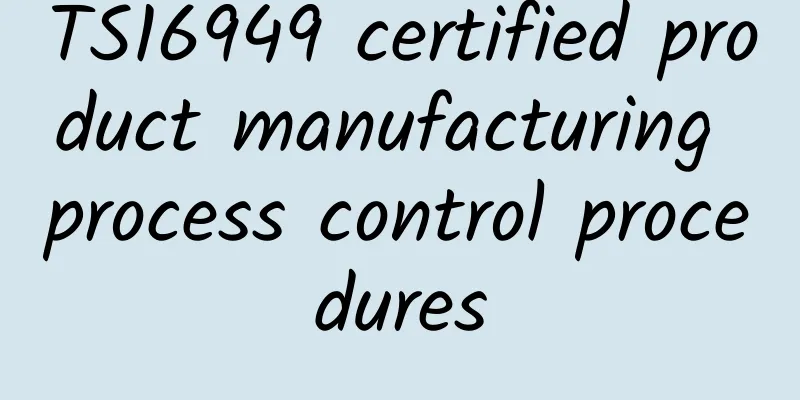TS16949 certified product manufacturing process control procedures

|
TS16949 certified product manufacturing process control procedures stipulate the control requirements of the company's product manufacturing process to ensure that the quality of each process in the manufacturing process is under control. Scope This procedure applies to the control of each production process in the company's manufacturing process. Introduction to TS16949 certification terminology in the automotive industry: Special process - a process whose results cannot be fully verified by subsequent inspection and testing of products or can only be verified by destructive testing. Key process - the process that forms the special characteristics of the product. Initial inspection - the inspection of the first or first few products produced after process factors have changed (such as equipment adjustment, tooling adjustment, material change, etc.). The purpose of the initial inspection is to verify whether the system is normal, and its conclusion determines whether to proceed with mass production. Inspection - a method whereby inspectors conduct random inspections of production processes. The purpose is to check whether there is any accidental deterioration in the system during the production process. The response plan is to stop the operation, find and eliminate the accidental deterioration, and conduct 100% inspection of the process products. Job preparation verification - verification of whether the operating conditions, including product characteristic requirements, meet the requirements when preparing for the initial operation of the job, changing materials, or changing the job. Implementation of TS16949 certification responsibilities: The production department is responsible for the centralized management of process control. It is responsible for the implementation of job preparation verification, the management of facilities, equipment, and tooling in the production process, process logistics management, and the formulation and implementation of production plans. The technical department is responsible for the provision of work instructions required for the production process, and is responsible for the confirmation of the production and service provision process. The marketing department is responsible for the procurement and provision of raw and auxiliary materials required for the production process and the formulation and implementation of emergency plans for incidental accidents. The quality assurance department is responsible for production process monitoring, production process monitoring and measurement device control, and the implementation of process product inspection and testing. The administrative personnel department is responsible for the allocation of production post personnel and organizes skills and qualification training for post personnel. What are the requirements for TS16949 certification training and qualifications?General process operators must undergo job training to meet the requirements of what they should know and what they should be able to do. Operators of special characteristics and special processes must undergo special technical training to enable them to have the necessary skill level and operating knowledge. Operators of special processes must undergo special technical training and obtain qualifications through assessment before they can take up their posts. What preparations are required for TS16949 certification work? All process position personnel must undergo pre-process training, and key process and special process position personnel must undergo professional skills training and obtain certification to meet the skills and qualifications requirements specified in the job description. According to the "Process Equipment Management Procedure", the tooling required for the process should be managed. Key and special process tooling should be subject to preventive maintenance and daily inspection maintenance before operation to ensure that its functional status is intact. According to the requirements of the "Facilities and Equipment Management Procedure", the infrastructure of the production site should be managed. Key equipment should be subject to preventive maintenance as planned. Before operation, inspections should be carried out according to the requirements of the "Equipment Daily Inspection Card" to ensure that the process facilities and equipment are in good condition. Process testing equipment used for process monitoring and product testing should ensure that it is in a calibrated state and that the results of appropriate measurement system analysis are acceptable. The Marketing Department controls all raw and auxiliary materials required for the process in accordance with the "Purchase Management Procedure" to ensure that they meet the specified requirements. The Administrative and Human Resources Department should ensure that valid versions of all process operating instructions derived from the control plan determined during the product development planning stage are provided to process operators, and the Production Department should ensure that these operating instructions are easily available at the operating position. The production department should formulate a monthly production operation plan based on the product sales plan of the marketing department and the product safety inventory level, and reasonably arrange production operation activities to ensure that products can be delivered on time. TS16949 certified production department should implement job preparation verification in the following situations: after new products or product changes; after changes in the operation process; after equipment maintenance; after abnormal shutdown. The operation preparation verification activities should formulate operation instructions. The operation can only be implemented after the operation preparation verification is completed and the non-conformity has been corrected, and the "Operation Preparation Verification Instructions/Record Form" must be filled in. Implementation and monitoring of the process The production department implements production operations according to the production operation plan and the corresponding operation instructions. The control methods of first piece, patrol inspection, X-R diagram, self-inspection and process inspection are used to monitor the product manufacturing process. When just starting work or changing shifts, the first piece produced shall be inspected by the operator; after adjusting equipment and process equipment; changing process parameters or operating methods; changing raw materials, blanks, semi-finished products; when there is a change in operating personnel; the first inspection items shall be determined by the on-site process technicians according to the above situations and carried out by the inspectors according to the operating instructions of the corresponding products. Mass production can only be started after the first inspection is passed or the reasons for failure are corrected. Inspections are conducted randomly by inspectors during the production process. The operation method is the same as the first inspection. In addition to arranging and implementing the unqualified response plan, all process products between two inspections must be 100% inspected. The characteristics (special characteristics) specified in the control plan should be sampled and inspected by inspectors at the frequency and volume specified in the control plan, and points should be drawn and determined on the control chart (X-R chart), and the response plan specified in the control plan should be implemented. Self-inspection and process inspections are carried out by operators and inspectors in accordance with the control plan and process documents. When an accident occurs, the production department should immediately notify the marketing department to start the accident emergency plan to ensure product delivery. Rapid response should be made to product/process information from inside and outside in accordance with the requirements of the "Quality Information Management Procedure" so that problems can be solved and implemented in the shortest time. The above content is a detailed introduction to the manufacturing process control procedures for TS16949 certified products. If you have any questions about the above article or want to know more about factory inspection knowledge, you can consult online on our website or communicate with our factory inspection experts one-on-one by phone. We guarantee to provide you with satisfactory service and the latest and most comprehensive factory inspection information. |
<<: Should I do HACCP certification or ISO22000 certification?
>>: Conditions for applying for ISO17025 laboratory accreditation
Recommend
The development of FSC forest certification in China
In 1999, FSC issued the first CoC certificate in ...
Anhui: Female employees can take (dysmenorrhea leave)
In January this year, the 67th executive meeting ...
Introduction to TS16949 Automotive Industry Quality Management System
TS16949 automotive industry quality management sy...
Mattel factory inspection and environmental protection knowledge
Mattel factory inspection and environmental prote...
Want to open a store on eBay? What are the fees?
Learn some tips about eBay fees, learn first and ...
New fire protection issues in WCA factory inspection (2014)
The new fire protection questions added to the 20...
eBay embraces the Belt and Road Initiative? Can foreign monks chant the sutra well?
Today, eBay announced the establishment of the In...
SVCOC Sustainable Viscose Certification Trading Certificate Content Standard
Sustainable viscose fiber can be compounded with ...
SQP factory audit standards (I)
SQ P factory audit standards (I) : 1. Quality Man...
Brief Introduction of Paris Spring Department Store (Factory Inspection) Group
Brief Introduction of Printemps Department Store ...
Decathlon factory inspection results-system
The results of Decathlon factory inspection are m...
HBC ES Ethical Factory Audit and Purchasing Standards
HBC ES ethical factory inspection and procurement...
What is the RetailEasy system? What are the advantages of the RetailEasy system?
Shanghai Chuangye Information Technology Co., Ltd...
What is Fruugo? What are the advantages of Fruugo?
Fruugo is an interesting platform that combines f...
How to withdraw cash from PayPal? How to withdraw cash from 2checkout?
Currently, PayPal has 5 ways to withdraw money: 1...






![What are some common email reply templates for eBay? [Ebay Tips]](/upload/images/67c99ff398782.webp)


